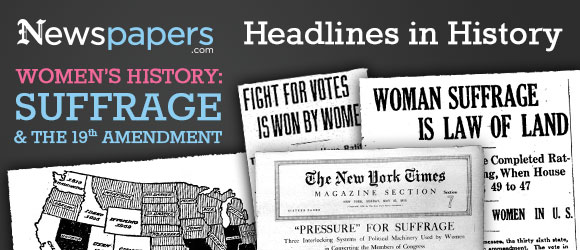 |
|
The Seneca Falls Convention in July 1848 marked the beginning of a movement to bring suffrage and other rights to women in the United States. In a 13 August 1848 column, The Times-Picayune of New Orleans printed a summary of the grievances issued at the convention, written “as a sort of parody” of the Declaration of Independence. The column met one of the conventioneers’ goals to “endeavor to enlist the pulpit and the press” in their cause. During World War I, suffragettes rallied in ever-increasing numbers. One such protest in Washington, DC, ended in the arrest of sixteen protesters who were “sentenced to 60 days’ imprisonment for activities about the White House.” It prompted a Washington Post article on 19 July 1917 about how the imprisoned ladies were treated and their reactions to incarceration. Disenfranchised women finally got the vote on 18 August 1920 when Tennessee became the 36th state to ratify the 19th Amendment, providing the three-fourths majority needed. The right to vote “shall not be denied or abridged … on account of sex” became the law of the nation, and the remaining twelve states ultimately ratified the amendment. Yet some, like North Carolina and Mississippi, put it off until much later: 1971 and 1984 respectively. The history of the 19th Amendment was recounted in a contemporary article by The Daily Capital News of Jefferson City, Missouri, commemorating the achievement. Fifty years later, and tied into the anniversary of the 19th Amendment, NOW (the National Organization for Women) organized a “Women’s Strike for Equality” to address equality in employment, politics, marriage, and many other arenas. Tens of thousands marched in New York and other cities. Newspapers as far away as Alaska reported on the rallies and demonstrations, as published in this 27 August 1970 article in the Fairbanks Daily News-Miner. |
One thought on “Women’s Rights Make Headline News 1848-1970”
Comments are closed.


Before I would even consider subscribing I would have to see a list of what newspapers are featured with this service–especially the historical archive list. Who, in their right mind would order a “pig in a poke”?